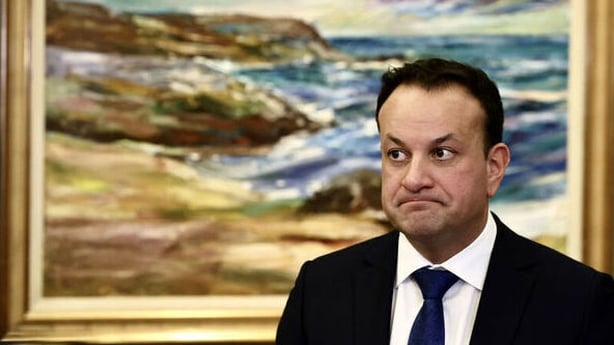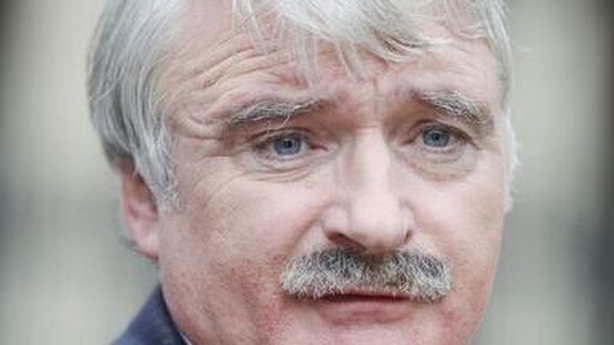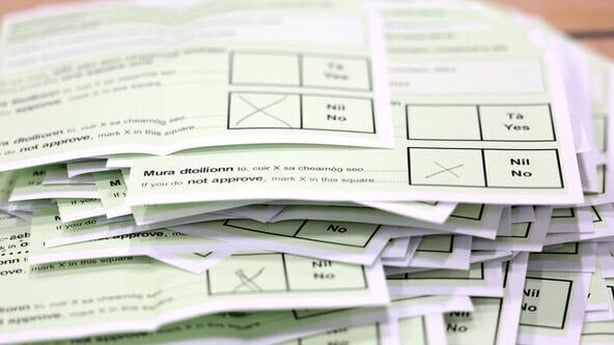When voters placed their pieces of paper in ballot boxes last weekend, it was the first time they did so in more than four years. You would have to go back to the 1970s and before that to the 1930s, when voters first ratified Bunreacht na h'Éireann, to find a gap that long between electoral events in this country.
The last time people voted before the referendums was in the 2020 general election.
That was weeks before Covid shut down the country, and all the upheaval that followed; it was before two major wars and the global uncertainty they have brought.
It was before the issue of migration exploded, literally on to the streets of Dublin, against the backdrop of a housing crisis.
The world has changed in the intervening four years and the two resounding referendum defeats last weekend indicate that so too has the relationship between politicians and the people they represent.
It will take much deliberation, many parliamentary party meetings, and no shortage of research to find out why people voted the way they did.
For now, TDs have largely settled on the conclusions that the referendums were poorly worded, poorly communicated and poorly timed - coinciding with International Women’s Day.
They were in essence, poor politics from start to finish.

The parties are hoping they can put it down to that: a bad day in the office from which lessons were learned, and draw a line in the sand and move on.
Or, as the Taoiseach put it to reporters in Washington: "The referendums are done."
And in many ways they are. There will be internal bickering, particularly when the parliamentary party meetings take place next week. The referendums will fall off the headlines and other more relevant issues will return to the forefront.
But politicians are shaken by the realisation that they misread the electorate and the electorate - it would seem from the results - misread them.
And their main reason for concern is the realisation that politics is now less predictable than ever.
The fact that the referendums were backed by all the main Dáil parties, yet were soundly defeated, says something about a sense of detachment.
"Covid put politicians in a bubble, and they haven't really emerged from that" mused one Government TD following the defeats.
Elections were already becoming more unpredictable, and Government formation more difficult, in the post-crash elections of 2016 and 2020. And most politicians agree that it is even more volatile now.
Another Government TD said there was a "deep disconnect" between how people in the senior ranks of Government anticipated these campaigns would play out, and how most citizens perceive them.
This was exemplified by the idea to hold them on International Women's Day, a symbolism the Taoiseach was overly eager to highlight when he announced these votes last December, but seems to have been a source of annoyance among many voters.
Some in Fianna Fáil are linking the results to concerns around migration. The ambiguity around "durable relationships" left open the possibility for fears to set in around what such a definition would mean for re-unification of family members. However it wasn’t just about that.

"There is a perceived lack of consultation from the Government around decisions effecting communities," a TD said. "That was there around the migration issue, but with the referendums it was a sort of a: who decided we want this?"
Taoiseach Leo Varadkar has criticised the role played by social media in the campaigns, particularly in relation to a clip of an interview he did on the Six O'Clock Show on Virgin Media that went viral.
In it, he spoke about the State's role in providing care, saying it's "very much a family responsibility, but families deserve the support of the State, and that's really what this article will say".
That was criticised and seized upon by No campaigners. Mr Varadkar put the criticism down to "classic social media" adding "you can say something in 40 seconds and somebody can take ten seconds of the 40 seconds and totally misrepresent it".
But that is the world we live in, where the nuance of political debate is unfortunately lost in the social media world. And it has shown to many TDs how there is now far less room for ambiguity in campaigning. Any room at all for doubt leaves a space in which seeds of fear and mistrust can be sewn.
This disconnect is all the more remarkable given that these referendums arose from the Citizens Assembly and similar previous processes.

The entire point of these was to move away from the bubble "group think" that was such a strong feature of Irish politics and decision-making before the crash, towards a more deliberate approach that best represented the views of citizens.
But in the end the Government opted to deviate from the recommendation arising out of that process (despite a cost of €650,000 to run the Citizens Assembly on Gender Equality) and as a result it, and the main opposition parties, have found themselves at a remove from the majority view of the electorate.
Whatever party proves to be most adept at bridging that gap, might well be the one that will reap the rewards come the next general election.
However with volatility now the word on everyone's lips, the referendum results hint at another fractured Dáil and a complicated process of government formation, whenever it might be.






